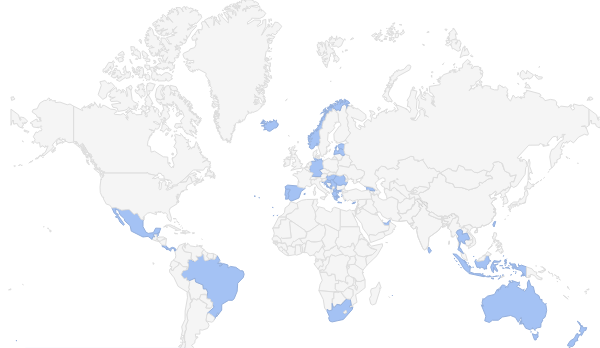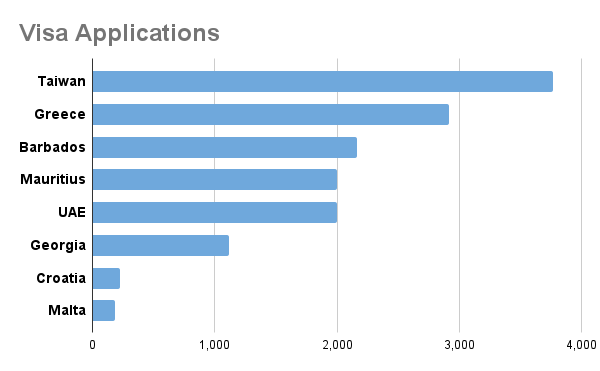What Is a Digital Nomad Visa?
These visas have been designed to be easier to obtain in terms of requirements, processing time, costs, and necessary paperwork. A digital nomad visa gives location-independent workers an opportunity to settle down for 1 or 2 years, offering a chance to relax and soak up a country’s culture and amenities without having to worry about visa issues.
We cover the following topics in this article:
RELATED ARTICLES
A digital nomad is someone who does not live at a fixed location but instead uses technology to work remotely from different locations, staying at each for only a few months or years. A digital nomad visa is an immigration framework that provides legal grounds for foreigners to stay in a country of which they are not a citizen for a relatively long period of time, while working remotely.
The term “digital nomad visa” was introduced by the Estonian government in 2020, when the country created a one-year visa that allows staying in a country and working remotely. Estonia was the first country in the world that created such a visa. This visa gives a special status to digital nomads, providing favorable conditions if they choose Estonia to live a segment of their nomadic life.
Not all governments use the term “digital nomad” for their visa programs, preferring a more general name that doesn’t quite so explicitly target people who have chosen this as a lifestyle. Depending on the country, a “digital nomad visa" may go by names such as "remote visa" or "freelancer visa". In some countries, this visa is also available to students. For example, Bermuda’s Work from Bermuda Certificate allows executives and students to work and study remotely from the island; Anguilla’s Lose The Crowd Find Yourself. Work. Life. Bliss. program allows not only digital nomads to live in Anguilla while experiencing their remote work dream, but also students and families. Dominica’s Work in Nature program offers a digital nomad visa not only for workers but for employers as well, allowing them to bring their family along.
The digital nomad visa was created to fill in a legal gap in traditional visa programs and give digital nomads the legal right to work remotely while residing in a foreign country. This type of visa allows digital nomads to stay for a longer period (up to 5 years) than they usually could under an ordinary tourist visa. Once the initial visa period is over, the holder may reapply for a visa to prolong their stay in the country.
At the same time, digital nomads can’t apply for a normal work visa, as in most cases this requires a contract with a local entity, which basically contradicts the whole point of a digital nomad lifestyle. This is where the digital nomad visa comes into play.
A digital nomad visa allows one to legally stay in a country for a set period of time, rather than worrying about overstaying a tourist visa. Some visas for digital nomads even allow you to bring your family and provide you with certain tax benefits. Local communities may also provide support specifically targeted for digital nomads.
What happens if I work remotely without a digital nomad visa?
To be honest, the probability of being caught while working on a tourist visa is quite low. Most local authorities won’t be looking for people with laptops on the beach, but that doesn’t mean they will never get caught. Those working without a proper visa are certainly at risk for operating within the gray area of the law. It’s always better to be safe than sorry when it comes to facing potential consequences for illegal work. Immigration laws in most countries include penalties when foreigners work in the country without proper work visas or permits. Penalties can include fines, detention, deportation, a travel ban, and even jail time. Also, working without a proper visa can deprive you of certain benefits such as healthcare and labor compliance in the country of your stay.
Here are some points why you may consider applying for a digital nomad visa:
- Work legally. Remote work has been a gray area for a while. With a digital nomad visa, a remote worker need not worry that a visa will be canceled due to illegal work.
- Stay longer than a tourist visa allows. With a digital nomad visa, you can stay in a country for up to 5 years without experiencing a “visa rush.”
- Enjoy favorable tax rates. Many digital nomad visa programs offer lower tax rates. Also, digital nomads may want to stay in the country for more than 6 months to be deemed a tax resident and thereby be subject to the local country’s tax regulations rather than their own.
- Bring your family with you. Almost all digital nomad visa programs provide applicants with the opportunity to bring along family members under the same application, which is not possible under the tourist visa.
- Start your business. Under the digital nomad visa framework, a remote worker is permitted to register a business in that country.
- Receive support from local communities. Some countries have developed incentive programs and other support initiatives for remoters who stay in the country under the digital nomad visa. Digital nomads are considered to be a good addition to an area for its economy, hence this support.
Therefore, if you are planning on working remotely abroad for a long period of time, to remain compliant you should obtain a digital nomad visa. A digital nomad visa eliminates travel visa restrictions, long waiting hours in an immigration office and visa runs, and it provides a lot of benefits.
Digital Nomad Visa vs Tourist Visa and Work Visa
Digital Nomad Visa
- A permit for foreigners to legally work remotely
- Does not allow being employed by a local company
- Rather fast and easy approval process
- Long duration period (up to 5 years)
- Allows bringing family members
- May require registration for tax purposes
- Can be renewed
Tourist Visa
- A permit for foreigners to visit a country
- Designed for tourism purposes only
- Working abroad is not permitted
- Fast approval process
- Short duration period (up to 3 months)
- Do not need to pay any taxes
- Can be renewed
- Family members must apply separately
Work Visa
- A permit for foreigners to work in a country for a local employer
- Designed for foreigners working abroad under a local contract
- Long and scrutinized approval process
- Long duration period (up to 10 years)
- Allows bringing family members
- Require registration for tax purposes
- Can be a path to permanent residency
Africa: Cape Verde, Mauritius, Seychelles, South Africa.
Asia and the Middle East: UAE (Dubai), Indonesia, Sri Lanka, Taiwan, Thailand.
Europe: Croatia, Cyprus, Georgia, Estonia, Germany, Greece, Hungary, Iceland, Latvia, Malta, Montenegro, North Macedonia, Norway, Portugal, Romania, Serbia, Spain.
Americas: Belize, Costa Rica, Mexico, Panama, Brazil.
Oceania: Australia, New Zealand.
The Caribbean: Anguilla, Antigua and Barbuda, Barbados, Bermuda, Cayman Islands, Curacao, Dominica, Grenada, Montserrat.
It is worth noting that not all the countries on this list have opened the application process for digital nomad visa yet. Some have just announced the launch and proposed amendments to legislation to implement the digital nomad visa framework.
On the right there is some statistical data available as of May 2022 on the amount of digital nomad visa applications in different countries.
The eligibility requirements, procedure, and costs for getting a digital nomad visa vary from country to country. However, there are some requirements that are common for all countries offering digital nomad visas.
To be eligible for a digital nomad visa, applicants should meet the following basic criteria:
- Able to work digitally and remotely:
- Hold a position in a company outside of their host country that provides them the freedom to work independently of location; OR
- Have a business that can be managed from anywhere in the world; OR
- Tend to work as a self-employed worker, delivering services on a contract or project basis.
- Demonstrate the ability to support themselves financially during their stay abroad. Most countries require a specific monthly income requirement to qualify for a visa.
- Should not be considered a threat to the security and health of the country of destination.
- Have comprehensive health insurance for the whole period of your stay.
As each country has its own policies and regulations in place, you should carefully consider the policies and regulations of the country you have in mind. Some allow online applications, while some require submitting an application through an embassy. How your digital nomad visa application is processed solely depends on the country and its immigration authorities. Generally, the application process has been simplified to provide better access for digital nomads to apply. So, processing should not take longer than a few months or even weeks. For instance, to get a one-year visa in Barbados, digital nomads have to wait just seven days for approval.
Note that not every remote worker qualifies for a digital nomad visa. Eligibility may also depend on whether your country is among the list of eligible nations permitted to apply for such a visa. Your history of visa applications may also play a crucial role.
Unlike a more typical expat, you won’t have to commit to any of the settling-in requirements such as paying tax, opening a bank account, or getting a permanent address. So long as you are able to prove you have a steady income, pay the visa fees, and purchase international health insurance, you’re likely to be accepted.
The pandemic has enabled professionals from all over the world to work remotely and become location-independent. Most remotes work under a tourist visa while staying abroad, which is technically illegal. To provide foreigners with a legal basis, many countries have issued digital nomad visas, which are usually short-term — but longer in duration than typical tourist visas. They represent an excellent opportunity for digital nomads and freelancers who want to travel and legally work remotely.
Eventually, the immigration and tax laws of most countries will be updated to accommodate digital nomads and their needs. However, until that time, you should consider your options carefully and weigh all the risks before you move. HelloImmigration.com takes a holistic, global approach to dealing with immigration questions. Our immigration experts will assist you with choosing the right destination for you and dealing with the paperwork and specific country’s requirements to obtain a visa. Contact our team for support.


